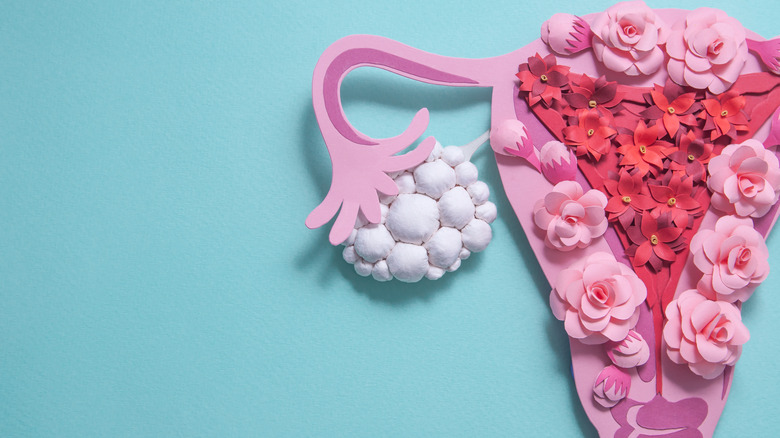What Does It Feel Like When You Have Ovulation Pain?
As women, we've had little choice but to become pretty well acquainted with our periods. We know when it's coming, how long it's planning to stay, what each day of it will feel like, and why it will feel that way. At this point, it's pretty much second-natured. However, for some reason or another, ovulation maintains an air of mystery for many of us. Perhaps, we don't know exactly when it happens or what it feels like in our bodies.
During ovulation, a mature egg is released from the ovary and makes its way through the fallopian tube, where it lingers for 12 to 24 hours, in hopes of attaching to a sperm that will fertilize it (per Mayo Clinic). In a typical 28-day cycle, ovulation occurs approximately 14 days after the period. Of course, this is a more clinical view of ovulation. Functionally, it's a more individual process, which can best be monitored through cycle tracking. Once we start paying attention to it, patterns, like a spike in basal body temperature and changes in vaginal secretions become easier to identify.
For some of us, however, the symptoms of ovulation aren't as discreet. While some women ovulate without feeling anything terribly out of the ordinary, other women experience a phenomenon known as mittelschmerz – a German word that translates to "middle pain" (per Verywell Family).
What does it feel like and why does it happen?
With nearly 50% of women experiencing mittelschmerz at some point or another, it's not all that uncommon (per Verywell Family). However, only 20% will see it as a recurring part of their monthly cycle. Mittelschmerz is characterized by pain on one side of the lower abdomen that can feel like a dull ache, comparable to cramp-like or sharp pain, which can last anywhere from a few moments to a couple of days (per Mayo Clinic). Since the pain occurs in whichever ovary is releasing the egg, you may feel it one side month after month, or alternating sides, depending on the way your ovaries produce eggs.
Verywell Family explains that while there's no concrete evidence explaining why ovulation pain occurs, or why some women feel it when others don't, there are some theories. Perhaps it has something to do with a spasm in the uterus or the fallopian tubes, or maybe the sharp pain we feel is the egg splitting from the follicle. Keep in mind, when the egg is released from the ovary, there may be some bleeding, which could cause irritation in the peritoneum (the lining of the abdomen), as per Cleveland Clinic. While the exact cause remains unknown, experts agree that it is rarely cause for concern (via Verywell Family).
If you experience ovulation pain that goes beyond what is manageable, consult with your doctor as this could be a sign of more serious conditions, like endometriosis.


